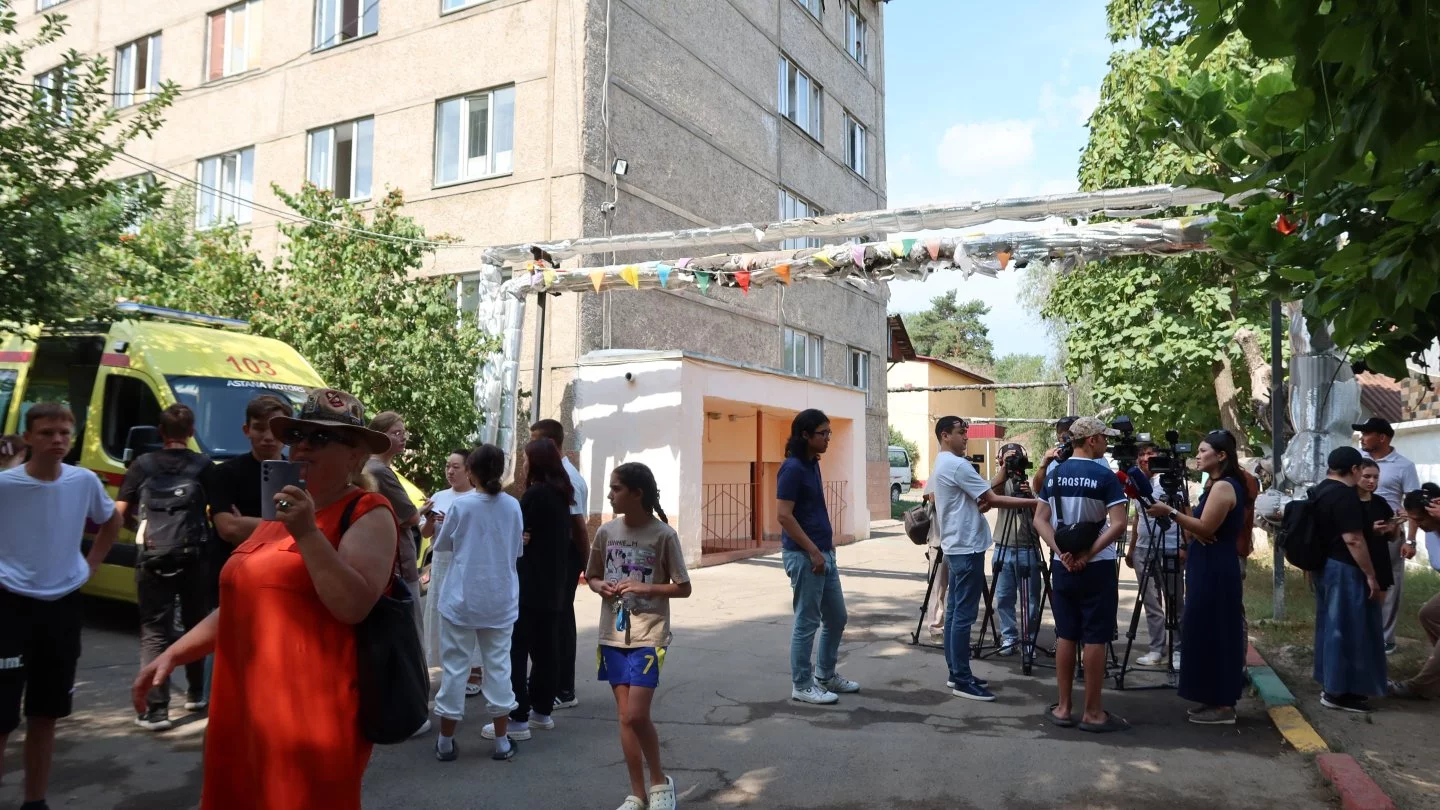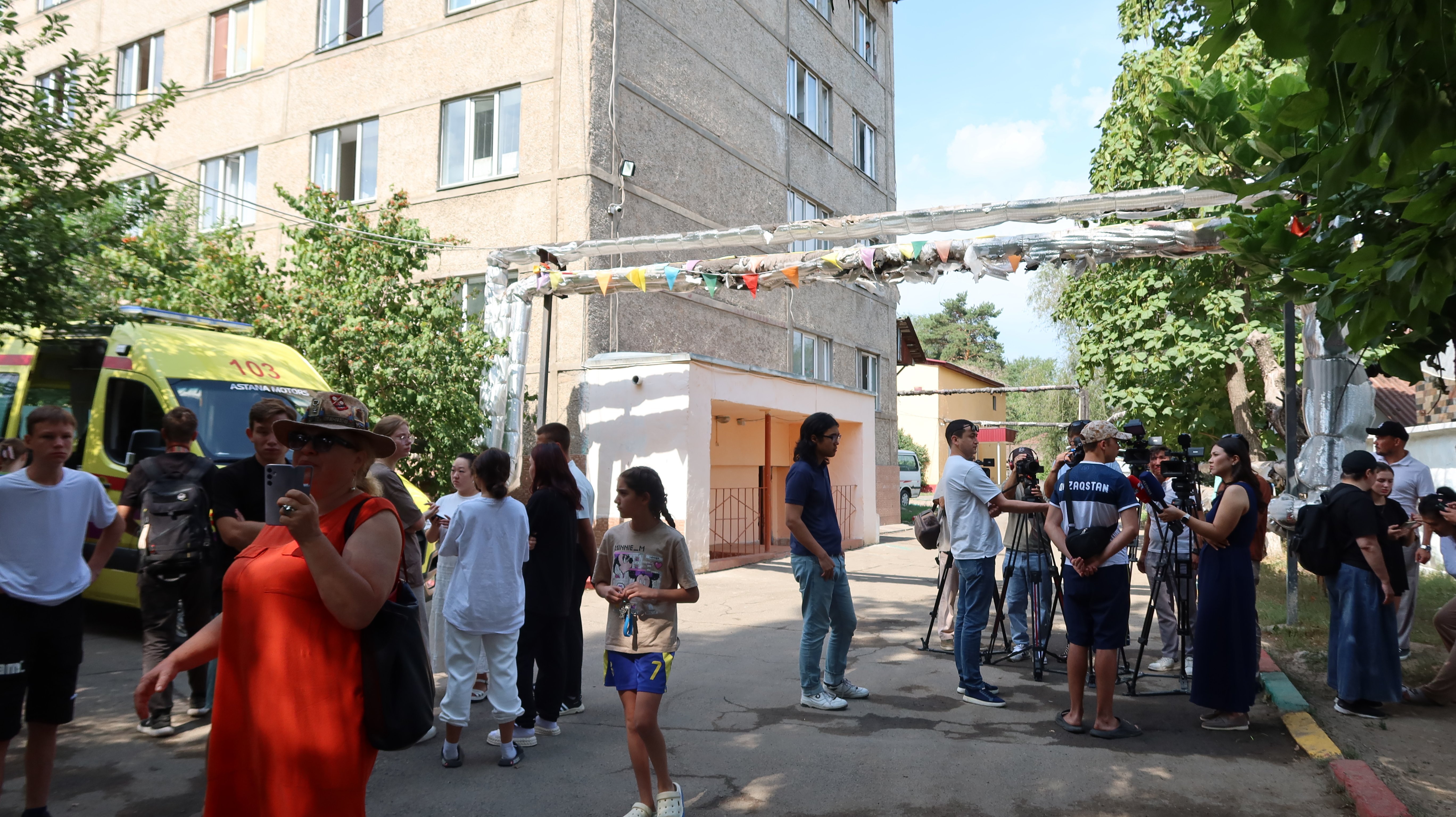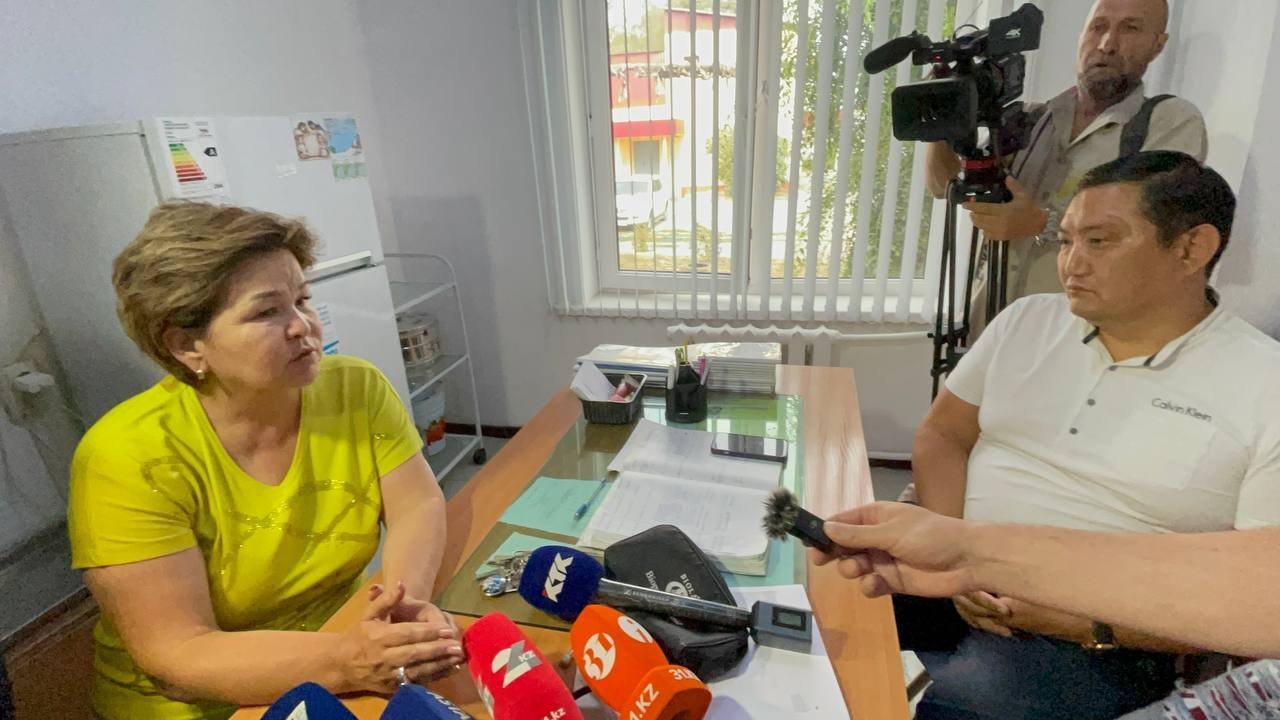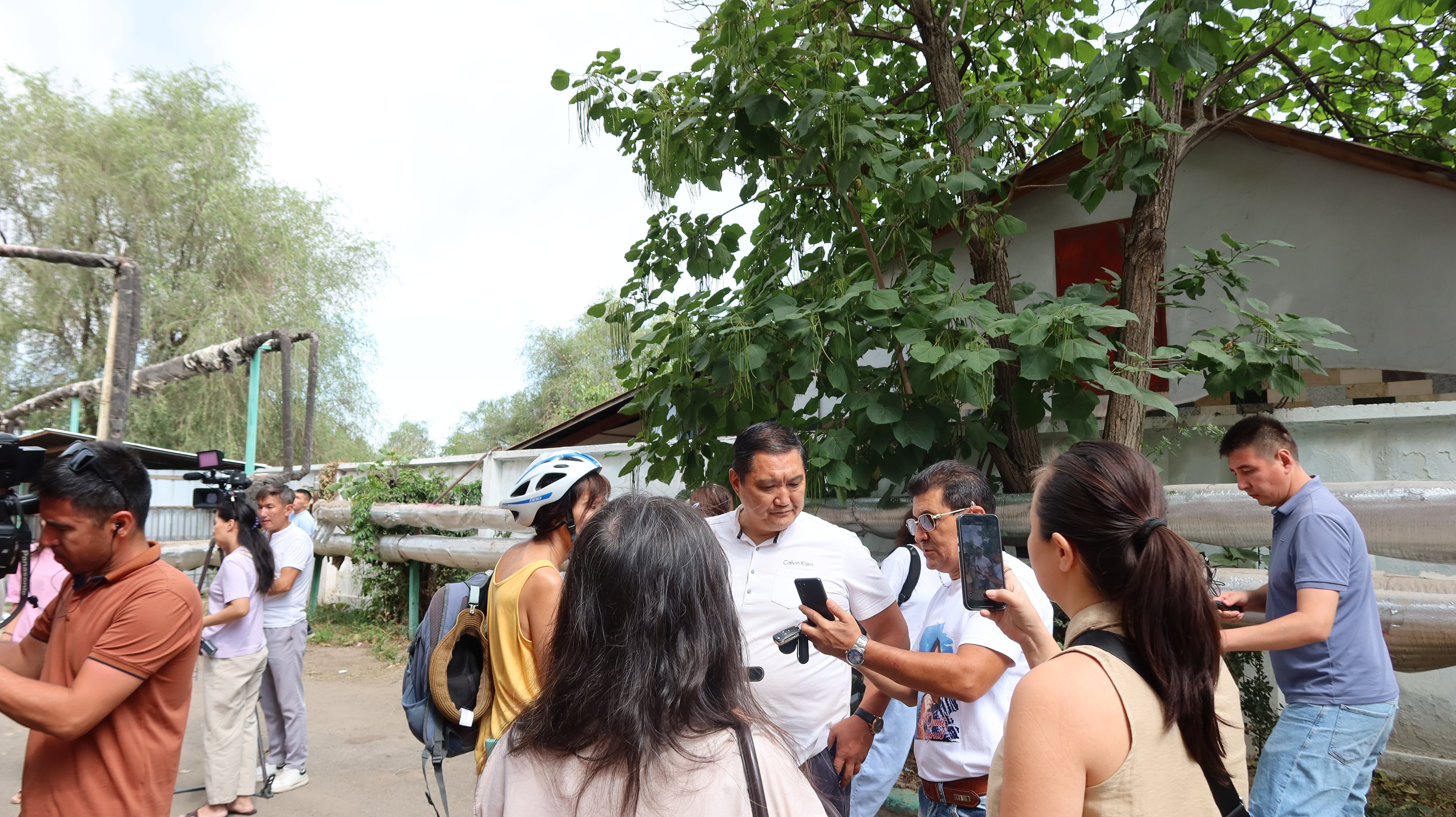Details On Situation Surrounding Baganashyl Orphanage
 Photo: Alexandra Mokhireva Orda.kz
Photo: Alexandra Mokhireva Orda.kz
It seems the story of Orphanage No. 1 in Baganashyl has finally reached a turning point. President Qasym-Jomart Toqayev personally intervened, Orda.kz reports.
It was officially announced that Almaty Akim Darkhan Satybaldy has been instructed to carry out major repairs on the orphanage building and transfer it to the city’s balance sheet. Additionally, the Presidential Administration will launch an internal investigation into the entire situation.
On the day this decision was made, an Orda.kz reporter was on the ground to witness what unfolded.
The Day Before the Decision
Activists and volunteers had alerted journalists that July 21 would be the day the relocation was set to begin. At 9:00 a.m., media were invited to gather at the orphanage gates to speak with the children and address the regional authorities publicly.
Just days earlier, Orda.kz had received a copy of a 2020 structural assessment of the orphanage building. Contrary to what had been claimed, the report did not identify the building as hazardous.
In 2020, we received a positive conclusion on the working project: 'Development of design and estimate documentation with a seismic report for the major repairs of the buildings of the Almaty Regional Children's Home No. 1 of the State Institution Education Department of the Almaty Region (the children's home was recently renamed) at the address Almaty, Bostandyq district, Syrgabekov Street, 22,' volunteers explained.
At the gates, protestors demanded the release of all documentation used to justify the relocation — this included the agreement between the developer and the regional Akimat, the emergency condition report, and any resolutions outlining the fate of both the old and new buildings, including their land plots.
Other lands, such as the long-disputed dacha plot, were also mentioned once again — though it has been a recurring topic in public discussions, its legal status remains unclear.
Still, these debates were overshadowed by the children’s desperate pleas to stop the move.
By 8:50 a.m., when Orda.kz arrived, adults and children were mingled in confusion. An ambulance was parked out front, along with a police car.

Authorities had moved up the relocation time without notice. Around 7:30 a.m., several buses arrived to remove children affiliated with the Adaptation Center for Minors. Around 40 children, temporarily housed at the orphanage, were boarded onto the buses.
A few resisted — and were reportedly forced to go. That’s when the situation erupted.
Some children stood in front of the buses, physically blocking them. The children said they were protesting being separated from their siblings.
This wasn’t their first act of resistance. When they learned the move was scheduled for Monday, the children locked the front gate themselves. But when regional representatives arrived, a guard cut the lock. That, and the bus standoff, escalated tensions quickly.
Unable to get through, drivers called the police.
Law enforcement officers became physical with the children.
Several children were hurt.
One boy was taken away in an ambulance after being knocked down by a police officer and scraping his leg. He later returned with a bandaged leg and red marks on his neck — reportedly from being grabbed by grown men.


Despite the protest, one of the buses carrying dozens of children eventually left the facility.
At the scene, the only officials present were representatives from the Almaty Region Education Department — the same ones who had previously led journalists on a tour of the new orphanage facility.
That day, they didn’t stay long. Attempts to speak with them again failed.
In contrast, local veterans came to support the children, not just symbolically, but physically standing beside them.


For a while, everyone spoke to everyone. Activists tried to reconstruct the timeline, asking questions that demanded accountability. But as the pressure grew, the group eventually moved inside to seek answers from the only person who hadn’t left the premises: orphanage director Roza Bekisheva.
In a cramped corridor filled with cameras and spotlights, a visibly overwhelmed Bekisheva — who, according to one activist, should have been on vacation — stood alone, trying to respond as questions rained down.


Regional officials had effectively abandoned her, leaving her to take the heat for decisions made far above her.
Bekisheva repeatedly explained that she was simply following orders and had no authority to make independent decisions about the children or the facility.
As Orda.kz has previously reported, Bekisheva has long maintained a simple stance: “Where the children go, I go.” She is not the one who decided whether they would stay or be relocated. She didn’t sign any memorandum with a developer and didn’t request this move.


This moment made it clear: the Akimat of Almaty Region had failed not only to explain its actions but to take responsibility for them. It had undermined public trust, and most importantly, the trust of the children.
For some time, the director was left alone. Outside, discussions continued among those gathered — many still voicing concerns over the new facility. Some described it as "terrible," mentioning nearby swamps.
Objectively, the building isn’t terrible. But it clearly wasn’t what the children wanted, and they were never truly consulted.


The dynamic shifted when Majilis Deputy Bakhytzhan Bazarbek arrived at the scene. Walking briskly toward the director, trailed by a crowd of reporters, he immediately began pressing for answers.

In March, the regional Akimat said: ‘The children will not be transferred anywhere.’ I sent an official request. The Akimat’s press service confirmed it — there would be no relocation, he reminded.
Director Roza Bekisheva tried to clarify the situation:
From the very beginning, it was said that only temporary children would be moved. 41 children were moved to Qonayev. These are children from the Center for Adaptation of Minors. Their documents are still being collected. Many parents want to bring their children back home.
But Bazarbek wasn’t convinced:
The most important thing for me is compliance with the law. We are obliged to consider the rights of the children. But here, you’re just relocating everyone. You say there was consent — but no independent commission was created. Journalists and civil society weren’t even invited.
Bekisheva insisted:
No one was forced. The resettlement happened with the consent of the children and the teachers. All the children were asked, and two groups gave consent.
Deputy then brought up the issue of the building’s structural integrity:
You claim the building is seismically unsafe. I have the emergency services’ report and another expert opinion here. But you don’t have anything from ‘Astana Qurylys Service,’ which you keep referring to. Why didn’t you involve a recognized state body like KazNIISA?
Bekisheva admitted:
I don’t have the conclusion. When the minister came, we took it to the education department. I couldn’t go — I had a spike in blood pressure.
Bazarbek pressed further:
I was told that the Qonayev building hasn’t even been transferred to the state balance sheet. If that’s the case, the children can’t be relocated there. What about water, electricity, gas?
Bekisheva replied:
If the building hasn’t been officially accepted and put into operation, then no, the children shouldn’t be moved. The state built it, but it has to be transferred to the education department.
The deputy pointed out that the entire process had lacked public transparency:
All of this could have been handled openly. Show the documents to the public and the media — here’s the assessment, here’s the resolution, here’s the construction report. What are you hiding?
Bekisheva answered simply:
These are questions for the regional Akimat and the Education Department. We report to them. We’re on their payroll.
As of now, some of those questions have received answers. The Qonayev facility was, in fact, transferred to the balance of the Almaty Region Education Department. According to cadastral records, the property is owned by a government institution.
As for the conclusion of Astana Qurylys Service, we wrote about it earlier. The contract for this work never appeared on the government procurement portal.
Orphanage director Roza Bekisheva claimed the company provided the assessment free of charge — no one has actually seen the document.

As the tense conversation between officials, activists, and journalists spilled outside, activist Aruzhan Sain had already arrived. Alongside the ongoing Baganashyl controversy, she brought up another case — the Nusupbayev boarding school for gifted children.
We’ve covered the Nusupbayev school before. The school’s situation turned disastrous when a developer who had pledged to renovate the facility failed to follow through. As a result, students were left living in near-Spartan conditions.
When the Almaty Region Akim first announced the cancellation of Baganashyl’s relocation, Children’s Rights Commissioner Dinara Zakiyeva said that Nusupbayev students would instead be moved to Qonayev. But the children from Nusupbayev didn’t want to move either.
Sain and Bakhytzhan Bazarbek tried to channel the energy of the gathering into clear demands. Without something tangible, the situation risked becoming symbolic.
Once that was said, the crowd began to disperse. Some sponsors and public figures remained behind, determined to personally monitor what would happen next.
Then, on the way back to the newsroom, we learned: the President had heard the children. And just like that, it was over.
History
Baganashyl’s story has deep roots. There are really two stories here: the recent relocation attempt, and a much older tale of land being stripped from the orphanage. In 2007, six hectares of land in the Qarasay district — used by the children as a vegetable garden and storage area — were taken away without compensation.
The land had been part of the orphanage’s holdings since 1958.
Officials also had their eye on the orphanage’s main site, but that time, public resistance helped preserve it. Even then, the director received threats.
The orphanage has historically owned valuable property, including a summer dacha in Almaty’s foothills. For years, the children spent their summers there. Since 2015, though, it’s sat abandoned. In 2023, a demolition order appeared on the state procurement site — but no one has clearly explained what became of the dacha.
Then there was the theft: in 2021, it was discovered that roughly 67 million tenge had been stolen from children's accounts. A teacher named Mustafina, who held power of attorney over their benefits from 2015 to 2020, opened accounts in their names, transferred money to herself, and withdrew the cash.
Orphanage director Kondybayeva learned about the fraud in 2018 but didn’t report it. Both women later pleaded guilty. Mustafina was sentenced to seven years in prison and banned from teaching for a decade.
Kondybayeva was fined 2.7 million tenge and barred from public service.
Orphanage No. 1 has gone through multiple rebrandings. Most recently, in February 2024, it was renamed the State Institution “Regional Center for Support of Children in Need of Special Social Services” under the Education Department of the Almaty Region.
Plans for relocation first surfaced on March 3. Even then, journalists and sponsors gathered at the gates. No one was allowed in. No one was even allowed on the grounds.
Few remember now, but one detail stood out at the time: trees were cut down on the property. It later turned out that this was unlawful.
By the time the public outcry erupted, the children had already toured the proposed new orphanage in Qonayev. They noticed swamps nearby — today rebranded as “reservoirs” — and a correctional facility in close proximity. They walked the area, saw the half-finished building, and tried to imagine their future there.
They weren’t optimistic.
They told their story to the media. Zakiyeva responded, saying the Baganashyl kids would stay put, and Nusupbayev children would be moved instead. Meanwhile, new children originally destined for Baganashyl would be sent to the new Qonayev building.
Where did the new building come from? Who owns the land? Who stands to benefit if the current orphanage is vacated? What really happened at Nusupbayev? Who’s the developer? Orda.kz investigated all these questions in a detailed report.
At the time, we visited Baganashyl orphanage. It wasn’t uninhabitable, but it reflected a shoestring budget and a long-overdue need for repairs. It didn’t mean the children had to be relocated — but it did reveal a troubling lack of attention from the education department.
Months later, activists obtained documents confirming that the relocation was, in fact, moving forward — despite public promises to the contrary from the Akim of the Almaty region. Only after the story hit the media did the Akimat take notice.
That’s when “Astana Qurylys Service” and its supposed 2024 inspection were mentioned for the first time.
Feeling deceived, the children recorded a video appeal addressed to President Toqayev, Commissioner Dinara Zakiyeva, Deputy Bakhytzhan Bazarbek, and anyone else who might care.
Journalists were invited to Qonayev to see the new facility. But it was a Saturday morning — 80 kilometers outside the city.
Orda.kz attended. We published a detailed report covering not only the new building but also the current orphanage. We asked every question that had been piling up — and we got some answers.
Which brings us back to July 21, when the controversial relocation was finally halted.
As for the new building, which was constructed at no cost to the government under a memorandum with the developer, it will still be used. Our editorial team will keep a close eye on how and when that happens.
The volunteer group Lider.kz regularly reports on the children of the Baganashyl orphanage. Just two days ago, two girls born in 2009 and 2010 went missing. Over the past several months, dozens of children from the institution have been reported missing.
Original Author: Alexandra Mokhireva
Latest news
- Tokayev Congratulates Saudi Leaders on Founding Day
- Undocumented Kazakhstanis in South Korea Can Leave Without Penalties Until Late February 2026
- Kalkaman Metro Station Construction Continues in Almaty
- Kazakh Peacekeepers on the Golan Heights Receive UN Medals
- Only Names Left: More Than 80 Villages Disappeared in Kazakhstan in a Year
- Environmental Safety to Be Added as Constitutional Principle
- Russian Fighter Jet Makes Emergency Landing in Atyrau
- Kazakhstan’s Banks See First Early-Year Profit Drop Since the Pandemic
- Cyclone to Bring Snow, Rain, and Blizzards to Kazakhstan
- Investments, Aviation and Healthcare: Tokayev Holds Series of Meetings With U.S. Company Chiefs in Washington
- Kazakhstan Ready to Send Military to Gaza — Results of the «Board of Peace»
- Ex-Prince Who Sold a Mansion to Kulibayev Arrested in Epstein Case
- Almaty Will Not Build New Sports Facilities for the 2029 Asian Games
- Earthquake Recorded in Kazakhstan in 2020 May Have Been China’s Nuclear Test
- Kazakhstan May Move Constitution Day to March 15
- Kazakhstan’s Cinema Market: Kazakhfilm Fined, Kinopark Under Antitrust Scrutiny
- Kazakhstan Extradites Tax Fraud Suspect from Kyrgyzstan
- New 5.3-km Hiking Trail to Big Almaty Lake Planned for 2026
- Kazakhstan Introduces New Rules for Parcels Ordered from Foreign Marketplaces
- FlyArystan Appoints Executive from European Airline as CEO

